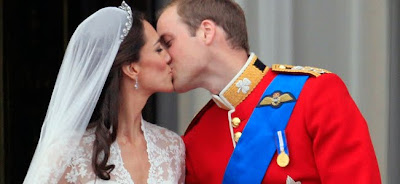
Hello everyone!
Today I woke up extra early to watch the royal wedding. It was totally worth it. I've been looking forward to watching it for days. I mean, seriously! A woman from a self-made family falls in love and gets to marry a prince in real life! How cool is that? On top of that, I've read a lot of good things about Prince William, from him serving in the military to sneaking out and sleeping on the streets of London to understand the plight of the poor. I will be praying that they have a wonderful marriage.
There was also a bit of humor at this historic, enchanting event, which occurred at the most important part: the kiss. I actually was bummed out, because I thought I had missed it. However, I then found out that they weren't actually going to kiss until they arrived at Buckingham Palace. When it finally happened, I applauded and whooped from the seat of my couch. Then I laughed when Piers Morgan and his fellow reporters got into an argument over the couple's kiss.
"It was a great kiss!" Piers said emphatically, "It was a great, big juicy smacker!"
I personally agreed with Piers, but his fellow reporters were not impressed, and neither was the crowd in attendance.
"Kiss again! Kiss again!" They chanted.
The Duke and Duchess of Cambridge obliged, and indeed, the second kiss was even better. It was a fitting end to a celebration that boasted the kind of class and fanfare that only the British could truly pull off.
To all my readers and friends, I wish you all a Happy Royal Wedding Day, and God bless Prince William and Princess Kate!
*The picture used is from Yahoo!News. I claim no rights of ownership over the image and am posting it for the fair use purpose of commentary only.